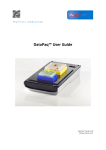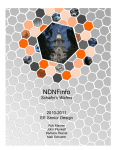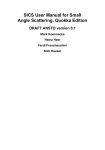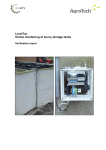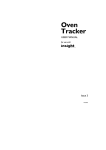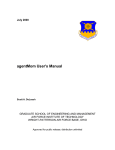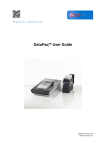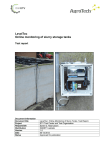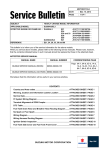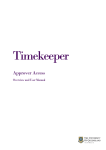Download DataPaq™ 2.40 Remote Control User Manual
Transcript
PRACTICAL INNOVATION DataPaq™ Remote Control User Guide DataPaq™ Version 2.40 Manual Version rev. 1 PRACTICAL INNOVATION DataPaq™ Remote Control User Guide All Rights Reserved. Ziath™ and DataPaq™ are registered trademarks of Ziath Ltd. No part of this publication, in either its printed or electronic format, may be copied, reproduced or transmitted in any form or by any means, electronic or mechanical, for any purpose involving resale for profit or gain, through any form of paid membership or subscription service, without the express permission of Ziath Ltd. DataPaq™ User Guide © Copyright 2008, 2009, 2010, 2011, 2012, 2013, 2014 Ziath Ltd. Revised 15/08/2014 P a g e 2 of 34 • D a t a P a q ™ R e m o t e C o n t r o l U s e r M a n u a l PRACTICAL INNOVATION DataPaq™Remote Control Introduction The headless enhancement to DataPaq allows for the interaction of a separate computer program to control the scanner and retrieve the results. This is enabled by a separate program entitled Server.exe which is provided. This will interact with DataPaq and control the scanner without a Graphical User Interface showing on the screen. There are two modes in which the server can be started up: (i) command line mode, and (ii) server mode. Activating Demonstration Mode DataPaq can operate in a demonstration mode; in this mode it will load a prescanned image to decode. This has the advantage that an integrator does not need a DataPaq scanner attached to their computer when performing integration work. To activate this mode, take the following steps: Install DataPaq, start the application (not in headless mode) and select Trial mode when prompted (You may enter a license key but the license key will be locked to your development machine – should you require a developer's license, please contact support at [email protected]). Open the options window and expand the width to the right to reveal the Dev Settings option: D a t a P a q ™ R e m o t e C o n t r o l U s e r M a n u a l • P a g e 3 of 24 PRACTICAL INNOVATION Add in a demo scanner; for this example we will use the AV6 scanner Setup a 96 well portrait plate (don't forget the unique ID). Close DataPaq. An image of the plate is required. If there is a rack available then place a plate onto the scanner and take a greyscale image (using the windows document and scanner wizard or other software such as IrfanView http://www.irfanview.com) of the entire available space on the scanner (not just the rack) – save this image in a format which is lossless such as png or bmp. Copy this image to a defined location. If no rack or scanner is available then please contact support at [email protected] with the information of the make and model you wish to scan. Open the configuration file at C:\%PROGRAMDATA%\Ziath\DataPaq\settings.xml (note that this is the ProgamData folder and not the Program Files folder and you will need to activate the Show Hidden Files and Folders option in File Explorer). If on windows XP this folder will be different and depend upon the language setting of your computer. At the top of the file is the plate group you have just configured with an empty attribute called demo - add into this the full filename and path of the image file you just copied into the DataPaq install directory P a g e 4 of 34 • D a t a P a q ™ R e m o t e C o n t r o l U s e r M a n u a l PRACTICAL INNOVATION Restart DataPaq and read this plate group; it should show Loading Demo Image and then decode the image. This plate group will now execute with no scanner attached. This will operate in normal mode or in headless mode. .NET Library Ziath provides a .NET library for integration use; contact [email protected] for a reference. Java & Python Sample Code Ziath provide sample code in Java and Python; the Java code is at the end of the manual and contact Ziath for the Python code. Command Line Mode Command line mode allows the user to simply execute a command line at the command prompt: the software will start up, execute the scanner and return the results formatted according to the supplied commands in the command line. To start the server in command line mode you simply need to specify the following options: Short Form c Long Form Calibrate Params None Default None e Exportformat excel|text|xml Text f Exportfile filename Stdout b Rackbarcodes comma separated string Unknown g Scannergroup group uid None v Verbose None None j Saveimage filename None k Scanimage filename None Description Instructs the scanner to calibrate the specified plate group. The plate group id must be supplied for this command. Note that if this is not specified, the scanner will run a scan operation. Sets the format of the export, set to either xml, json, excel or text. Specifies the file to write to. If this is not specified the results will be written to the standard out of the process (typically to the console). A comma separated list of the rack barcodes (note – should the rack barcode scanner be installed, this option will be ignored). The id of the scanner group to scan or calibrate. If specified DataPaq will post comments on progress to the screen. If specified along with a scan this will save the raw image in png format to the specified filename This will scan and save a raw image to D a t a P a q ™ R e m o t e C o n t r o l U s e r M a n u a l • P a g e 5 of 24 PRACTICAL INNOVATION l Linear None none the entered filename. It will not attempt to decode the image it will just save it This will scan the linear barcode on the rack and return. The scan result will be returned on stdout For all filename you can use the following placeholders: #date# - inserts the date in iso format #time# - inserts the time in iso format #barcode# - inserts the rack barcode in iso format #uid# – inserts the unique id #plategroup# - inserts the name of the group represented by the uid Therefore, due to the defaults, the simplest command line operation of DataPaq is as follows: Server -g 1234 This will run the scanner to scan in command line mode, returning the results in text format to the command line. A more sophisticated example follows: Server -g 1234 -f results.xls -e excel -b CODE1,CODE2,CODE3 This will execute the scanner, using the codes CODE1 to CODE3 as the rack barcodes. The results will be returned into an excel file which is called results.xls. When the process exits, it returns an exit code. The number returned gives an indication of the success of the command: Exit code 0 – the process executed and returned cleanly, no errors occurred Exit code 1 – the command line options could not be specified Exit code 2 – the specified port for server mode (see below) could not be opened Exit code 3 – the plate group was not specified Exit code 4 – the execution of the scan or calibrate failed Exit code 5 – the result file could not be written Server Mode P a g e 6 of 34 • D a t a P a q ™ R e m o t e C o n t r o l U s e r M a n u a l PRACTICAL INNOVATION The server mode starts DataPaq and listens on a specified port for incoming commands. Multiple clients can attach to DataPaq; however, only one operation at a time can be performed. If starting in server mode, you need to specify the command line option s (server for longform). DataPaq will start and listen to a specified port for commands (by default the server will listen on port 8888) — however, this can be changed with the following command: Short Form P N Long Form commandPort notificationPort Params port number port number Default 8888 8686 Description The port that the server will listen on. The port that the notification server will transmit messages on Once the server is running in socket mode, the process will continue to listen to the socket until it is either closed or receives the command SHUTDOWN. Note that there is a maximum number of simultaneous client connections; the amount can be discovered by calling GET_MAX_CONNECTIONS. If this number is exceeded a string describing the current connections is returned and the socket closed fomr the serer side. An example of a command line to start the server is below: Server -s -p 8899 This will start the server running in socket mode which will listen for incoming connections on port 8899. The server responds to a set of commands: all commands must be terminated by a carriage return and a line feed; all responses will be terminated with a carriage return and a line feed. Should you need to close the server down and for some reason the server is not responding then if you connect to port 6699 then the server will immediately close down and close the connection. This is designed to be an emergency shutdown and should not typically be used to close the server. In addition; if the Ziath Linear reader is attached the presence of a plate can be automatically detected and this be notified and/or a scan automatically triggered. This notification is done on port 8686; this can be changed using the –n parameter if required. Commands Version Command: VERSION\r\n Response: <version code>\r\nOK\r\n When the server receives the command, it returns the version number of DataPaq that it is connected to. Example D a t a P a q ™ R e m o t e C o n t r o l U s e r M a n u a l • P a g e 7 of 24 PRACTICAL INNOVATION Received by Server: VERSION\r\n Response from Server: 1.1\r\nOK\r\n Get Max Connections Command: GET_MAX_CONNECTIONS\r\n When the server receives the command, it returns the maximum number of simultaneous client connections allowed Response: <number of maximum allowed connections>\r\nOK\r\n Example Received by Server: GET_MAX_CONNECTIONS\r\n Response from Server: 20\r\nOK\r\n Get Thread Report Command: GET_THREAD_REPORT\r\n When called this returns details on the threads on the server; note that client threads are labelled Server with the IP address of the client and the local port number the server is listening on. Response: <the thread report>r\nOK\r\n Example Received by Server: GET_THREAD_REPORT\r\n Response from Server: Group[system:class java.lang.ThreadGroup] Thread[Reference Handler:class java.lang.ref.Reference$ReferenceHandler] Thread[Finalizer:class java.lang.ref.Finalizer$FinalizerThread] Thread[Signal Dispatcher:class java.lang.Thread] Thread[Attach Listener:class java.lang.Thread] Thread[Java2D Disposer:class java.lang.Thread] Thread[Swing-Shell:class java.lang.Thread] Group[main:class java.lang.ThreadGroup] Thread[main:class java.lang.Thread] P a g e 8 of 34 • D a t a P a q ™ R e m o t e C o n t r o l U s e r M a n u a l PRACTICAL INNOVATION Thread[AWT-Windows:class java.lang.Thread] Thread[Thread-2:class com.ziath.datapaq.scannerconnection.ScanThreadImpl] Thread[Thread-3:class org.apache.log4j.xml.XMLWatchdog] Thread[Emergency shutdown socket server:class java.lang.Thread] Thread[Server - /0:0:0:0:0:0:0:1:58576:58576:class java.lang.Thread] Thread[Emergency shutdown socket server:class java.lang.Thread]\r\nOK\r\n Get Memory Usage Command: GET_MEMORY_USAGE\r\n When the server receives the command, it returns the current memory usage split into Allocated, Free, Max and Total Free Response: <memory usage report>\r\nOK\r\n Example Received by Server: GET_MEMORY_USAGE\r\n Response from Server: FREE_MEMORY:12111|ALLOCATED_MEMORY:15872|MAX_MEMORY:253440|TOT AL_FREE_MEMORY:249679\r\nOK\r\n Get UIDS Command: GET_UIDS\r\n Response: 2|Standard Single Plate|96 Well Plate\r\n 1|Standard Single Plate|48 Well Plate\r\n <uid>|<Scanner Name>|<Group Name>\r\n OK\r\n When the server receives this command, it will return all the UIDs in the system. The return will be the UID, followed by the plate group name, separated by a pipe (|). Each D a t a P a q ™ R e m o t e C o n t r o l U s e r M a n u a l • P a g e 9 of 24 PRACTICAL INNOVATION line is terminated by a carriage return and a line feed and signifies a new plate group; the final line is OK followed by a line feed and carriage return. Example Received by Server: GET_UIDS\r\n Response from Server: 1|Single Plate Standard Focus |96 Well Plate\r\n 2|Single Plate Standard Focus |48 Well Plate\r\n 5|Single Deep Standard Focus|96 Well Plate\r\n OK\r\n Status Command: STATUS\r\n Response: <status>\r\nOK\r\n When the server receives the command, it returns the status of DataPaq. These can be as follows: o IDLE – DataPaq is ready to accept a command o BUSY – DataPaq is currently executing a command o ERROR – DataPaq encountered an error; it will keep this status until a command is successfully executed Example Received by Server: STATUS\r\n Response from Server: IDLE\r\nOK\r\n Scan Command: SCAN <uid of group to scan> <export format> <comma separated list of rack barcodes>\r\n Params o uid – this is the unique id of the scanner group. This can either be manually set in the DataPaq config file or can be specified using the DataPaq GUI. P a g e 10 of 34 • D a t a P a q ™ R e m o t e C o n t r o l U s e r M a n u a l PRACTICAL INNOVATION o export format – this is the return format for the read: it can be excel, xml, json or text o barcodes – this is a comma-separated list of rack barcodes; for example: CODE1,CODE2,CODE3. Note that should the rack 1D barcode scanner option be installed then this option will be ignored and the results of the barcode scanner will be used instead. Response: OK\r\n [the scanner scans and then] <result of scan>\r\nOK\r\n When the server receives this command, it scans the deck and returns the results to the caller via the connected socket. The scanner will either return a string, if text as the export format is supplied, or it will return a stream of bytes which represent a binary excel file. Should the scan fail, the system will return ERR\r\n with a description of the error. Note that the format of the text returned can be changed upon request; should you require this to be done then please contact Ziath at [email protected]. Example Received by Server: SCAN 1234 text 1,2,3\r\n Response from Server: OK\r\n [The scanner does its scan] ScanID,Date,RackBarcode,Row,Col,tubeBarcode 1,13-Nov-2008 22:06:18,CODE1,A,1,1013587786 1,13-Nov-2008 22:06:18,CODE1,A,2, 1013586701 1,13-Nov-2008 22:06:18,CODE1,A,3,1013587788 … … 1,13-Nov-2008 22:06:18,CODE3,H,10,1013588736 1,13-Nov-2008 22:06:18,CODE3,H,11,1013588735 1,13-Nov-2008 22:06:18,CODE3,H,12,1013588208 OK\r\n Calibrate Command: CALIBRATE <plate group id to calibrate> D a t a P a q ™ R e m o t e C o n t r o l U s e r M a n u a l • P a g e 11 of 24 PRACTICAL INNOVATION Params o uid – the plate group to calibrate Response: OK\r\n [the scanner calibrates and then] OK\r\n Upon receiving this command, the scanner will calibrate the specified plate group with the racks on the deck of the scanner. It will initially return OK, perform the scan and then return OK when the scan is finished. Should the calibration fail, the scan will return ERR\r\n with a description of the error message. Example Received by Server: CALIBRATE 1234\r\n Response from Server: OK\r\n [The scanner does its calibration] OK\r\n Last Image Command: LAST_IMAGE <The Scanned Position, starting at 0> <the scale factor (optional)> <format (optional)>\r\n Response: <the image – as a multi-line base 64 encoded string>, <A blank line>, OK\r\n Upon receiving this command, the server will retrieve the last image scanned for the current position, annotate the image, encode the image as the requested format, further encode the image into a base64 string and send it to the client, if the scale factor is supplied the image will be scaled otherwise it will be scaled to 1. The format can be png, jpeg or bmp; if not supplied a png image will be returned. Once the entire image has been sent, DataPaq will then send an empty line, followed by OK\r\n. Errors: ERR10 – Image number cannot be parsed, typically because it is not an integer ERR12 - No image available (because no scan was run after DataPaq started up) ERR16 – not enough parameters supplied, at least the image number must be supplied ERR22 – Scale factor cannot be parsed, typically because it is not an Integer or a double ERR25 – Image format was not one of png, jpeg or bmp Example: P a g e 12 of 34 • D a t a P a q ™ R e m o t e C o n t r o l U s e r M a n u a l PRACTICAL INNOVATION Received by Server: LAST_IMAGE 0 0.5 jpeg\r\n Response from Server: <A Number of base64 encoded lines containing the image> <A blank line> OK\r\n Save Last Image Command: SAVE_LAST_IMAGE <The Scanned Position, starting at 0> <Location to save file> <the scale factor (optional)> <format (optional)>\r\n Response: OK\r\n Upon receiving this command, the server will retrieve the last image scanned for the current position, annotate the image, encode the image as a png, and save it to the location specified in the second parameter. Should the filename contain spaces, wrap the filename in double quotes to escape the spaces. Once the entire image has been saved, DataPaq will then send OK\r\n. IF no scale factor is entered then the image will not be scaled and if no format is requested the image will be a png file. Available formats are png, jpeg and bmp. Errors: ERR10 – Image number cannot be parsed, typically because it is not an integer ERR12 - No image available (because no scan was run after DataPaq started up) ERR17 – Image cannot be saved (unusually due to either a bad file name or permission problems with the file location) ERR22 – Scale factor cannot be parsed, typically because it is not an Integer or a double ERR25 – Image format was not one of png, jpeg or bmp Example: Received by Server: SAVE_ LAST_IMAGE 0 “c:\Users\benn\datapaq image.jpg” 0.2 jpeg\r\n Response from Server: OK\r\n D a t a P a q ™ R e m o t e C o n t r o l U s e r M a n u a l • P a g e 13 of 24 PRACTICAL INNOVATION Last Raw Image Command: LAST_RAW_IMAGE <The Scanned Position, starting at 0>\r\n Response: <the image – as a multi-line base 64 encoded string>, <A blank line>, OK\r\n Upon receiving this command, the server will retrieve the last image scanned for the current position, encode the image as a png, further encode the image into a base64 string and send it to the client. Note that this image is the raw image from the imaging device and is therefore quite large. Once the entire image has been sent, DataPaq will then send an empty line, followed by OK\r\n. Errors: ERR10 – Image number cannot be parsed, typically because it is not an integer ERR12 - No image available (because no scan was run after DataPaq started up) ERR22 – Scale factor cannot be parsed, typically because it is not an Integer or a double ERR25 – Image format was not one of png, jpeg or bmp Example: Received by Server: LAST_IMAGE 0\r\n Response from Server: <A Number of base64 encoded lines containing the image> <A blank line> OK\r\n Save Last Raw Image Command: SAVE_LAST_RAW_IMAGE <Location to save file>\r\n Response: OK\r\n Upon receiving this command, the server will retrieve the last image scanned for the current position, encode the image as a png, and save it to the location specified in the second parameter. Should the filename contain spaces, wrap the filename in double quotes to escape the spaces. Note that this is the raw image from the imaging device and is therefore rather large. Once the entire image has been sent, DataPaq will then send OK\r\n. P a g e 14 of 34 • D a t a P a q ™ R e m o t e C o n t r o l U s e r M a n u a l PRACTICAL INNOVATION Errors: ERR12 - No image available (because no scan was run after DataPaq started up) ERR16 – not enough parameters supplied ERR17 – Image cannot be saved (unusually due to either a bad file name or permission problems with the file location) Should there be no image available (because no scan was run after DataPaq started up), DataPaq will return ERR12. Should the incorrect parameters be returned DataPaq will return ERR16, ERR17 is returned if the image cannot be saved (unusually due to either a bad file name or permission problems with the file location) Example Received by Server: SAVE_ LAST_IMAGE 0 “c:\Users\benn\datapaq image.png”\r\n Response from Server: OK\r\n Close Command: CLOSE\r\n Response: OK\r\n Upon receiving this command, the scanner will close the client which requested the close. To cleanly disconnect your client, it is recommended to call this method. Note that this will not affect any other clients attached to DataPaq at the time. Example Received by Server: CLOSE\r\n Response from Server: OK\r\n [The server disconnects the client] Shutdown Command: SHUTDOWN\r\n Response: OK\r\n D a t a P a q ™ R e m o t e C o n t r o l U s e r M a n u a l • P a g e 15 of 24 PRACTICAL INNOVATION Upon receiving this command, the scanner will shutdown and the server process will exit, but only if the scanner is idle. Should the scanner fail to shut down, ERR\r\n will be written, followed by a description of the error message; however should this happen the Server will still shutdown (except in the case of the server being busy). Example Received by Server: SHUTDOWN\r\n Response from Server: OK\r\n [The scanner shuts down] OK\r\n Force Shutdown Command: FORCE_SHUTDOWN\r\n Response: OK\r\n Upon receiving this command, the scanner will shutdown and the server process will exit, even if the scanner is running – use this command with caution. Should the scanner fail to shut down, ERR\r\n will be written, followed by a description of the error message; however should this happen the Server will still shutdown. Example Received by Server: SHUTDOWN\r\n Response from Server: OK\r\n [The scanner shuts down] OK\r\n Get Barcode Scanner Com Port Command: GET_BARCODE_SCANNER_COM_PORT\r\n Response: COM5\r\nOK\r\n When receiving this command DataPaq report the com port used by the 1D barcode rack scanner. Should the port not be set then ERR21 will be returned. Example Received by Server: GET_BARCODE_SCANNER_COM_PORT\r\n Response from Server: COM5\r\nOK\r\n Get All Com Port IDs Command: GET_ALL_COM_PORT_IDS\r\n Response: COM1,COM3,COM4,COM5\r\nOK\r\n P a g e 16 of 34 • D a t a P a q ™ R e m o t e C o n t r o l U s e r M a n u a l PRACTICAL INNOVATION When receiving this command DataPaq reports the com ports on the host computer with each port name separated by a comma. Example Received by Server: GET_ALL_COM_PORT_IDS\r\n Response from Server: COM1,COM3,COM4,COM5\r\nOK\r\n Set Barcode Scanner Com Port Command: SET_BARCODE_SCANNER_COM_PORT <The com port to connect to>\r\n Response: OK\r\n When receiving this command DataPaq disconnects the current 1D barcode scanner com port if it is connected. DataPaq then attempts to connect to the specified com port. If the specified com port cannot be found by DataPaq, ERR18 is returned. If for some reason DataPaq cannot connect to the com port then ERR19 is returned. Note that this only works for the hardware external linear scanner which has been discontinued by Ziath. Example Received by Server: SET_BARCODE_SCANNER_COM_PORT COM1\r\n Response from Server: [DataPaq disconnects from the current com port and reconnects to the specified com port]OK\r\n Enable Barcode Scanner Command: ENABLE_BARCODE_SCANNER\r\n Response: OK\r\n When receiving this command DataPaq enables the 1D rack barcode scanner. Example Received by Server: ENABLE_BARCODE_SCANNER \r\n Response from Server: OK\r\n Disable Barcode Scanner Command: DISABLE_BARCODE_SCANNER\r\n Response: OK\r\n When receiving this command DataPaq disables the 1D rack barcode scanner. Example Received by Server: DISABLE_BARCODE_SCANNER \r\n D a t a P a q ™ R e m o t e C o n t r o l U s e r M a n u a l • P a g e 17 of 24 PRACTICAL INNOVATION Response from Server: OK\r\n Get Barcode Scanner Enabled Command: GET_BARCODE_SCANNER_ENABLED\r\n Response: true\r\n When receiving this command DataPaq returns the state of the barcode scanner enabled/disabled flag. If enabled true is returned, otherwise false is returned. Example Received by Server: GET_BARCODE_SCANNER_ENABLED\r\n Response from Server: true\r\nOK\r\n Scan Linear Barcode Command: SCAN_LINEAR_BARCODE\r\n Response: <BARCODE>\r\nOK\r\n Upon receiving this command, the 1D rack scanner will attempt to scan a 1D rack barcode using the ZTS-1DR attached reader. If no barcode could be read ERR13 will be returned, ERR14 is returned when the barcode scanner cannot be communicated to (hardware linear scanner only) and ERR15 when neither the hardware or Ziath linear barcode scanner are enabled. Example Received by Server: SCAN_LINEAR_BARCODE\r\n Response from Server: B1268FR\r\nOK\r\n Clear Last Detailed Exception Command: CLEAR_LAST_DETAILED_EXCEPTION\r\n Response: OK\r\n This command will remove the last detailed exception on the server; note that this is the last detailed exception across all clients and not just this connected one. If there is no exception this will just return. Example Received by Server: CLEAR_LAST_DETAILED_EXCEPTION\r\n Response from Server: OK\r\n P a g e 18 of 34 • D a t a P a q ™ R e m o t e C o n t r o l U s e r M a n u a l PRACTICAL INNOVATION Decode Image Command: DECODE IMAGE <UID> <FORMAT> <MIME ENCODED RAW IMAGE> <RACK BARCODE(S)>\r\n Response: OK\r\n[IMAGE IS DECODED]<SCAN RESULTS>OK\r\n Upon receiving this command, DataPaq will load the image from the MIME string and attempt to decode it with the specified UID. Note that both the DataPaq install that made the image and the server that is decoding the image need to be licenced. Example Received by Server: DECODE IMAGE 1234 XML [MIME STRING] BAR1\r\n Response from Server: OK\r\n [WAIT] [SCAN RESULTS]\r\n Enable Decode Updates Command: ENABLE_DECODE_UPDATES\r\n Response: OK\r\n Upon receiving this command; the next time DataPaq decodes a rack a notification of each well decoded will be sent along with the number of wells to decode, note that also ticks up empty decoded wells. Note that the decoding is typically so quick that this will slow down decoding of the rack. These notifications appear between the OK received by a decode request and the scan results the notifications are in the format of 1 OF 96\r\n, 2 OF 96\r\n and so on. Example Received by Server: ENABLE_DECODE_UPDATES\r\n Response from Server: OK\r\n Disable Decode Updates Command: DISABLE_DECODE_UPDATES\r\n Response: OK\r\n Upon receiving this command; the next time DataPaq decodes a rack no notifications of each well decoded will be sent. Example Received by Server: DISABLE_DECODE_UPDATES\r\n D a t a P a q ™ R e m o t e C o n t r o l U s e r M a n u a l • P a g e 19 of 24 PRACTICAL INNOVATION Response from Server: OK\r\n Is Decode Updates Command: IS_DECODE_UPDATES\r\n Response: <TRUE|FALSE>OK\r\n If DataPaq is set to return decode updates when a tube is decoded this will return TRUE if not then FALSE will be returned. Example Received by Server: IS_DECODE_UPDATES\r\n Response from Server: FALSE\r\nOK\r\n Get Current Number of Connections Command: GET_CURRENT_NUMBER_OF_CONNECTIONS\r\n Response: <the number of currently connected clients>\r\nOK\r\n Upon receiving this command; DataPaq will return the number of currently connected clients including this client. Example Received by Server: GET_CURRENT_NUMBER_OF_CONNECTIONS \r\n Response from Server: 2\r\nOK\r\n Get Connected Scanners Command: GET_CONNECTED_SCANNERS\r\n Response: <as list of the connected scanners>\r\nOK\r\n Upon receiving this command; DataPaq will return a list of connected scanners delimited by pipes. If no scanners are connected |NONE| will be returned. The possible scanner identifiers that could be returned are : DEEP_FOCUS – this is version 1 and version 2 HIGH_SPEED – this is version 1 of the high speed scanner HIGH_SPEED_2 – this is version 2 of the high speed scanner P a g e 20 of 34 • D a t a P a q ™ R e m o t e C o n t r o l U s e r M a n u a l PRACTICAL INNOVATION MULTIRACK_8800 – this is version 1 of the multirack scanner MULTIRACK_9000 – this is version 2 of the multirack scanner PLUSTEC_A3 – this is a specialist extra large scanner CAMERA – This is the express scanner If for some reason this list cannot be returned error 33 is thrown Example Received by Server: GET_CONNECTED_SCANNERS\r\n Response from Server: |CAMERA|DEEP_FOCUS|\r\nOK\r\n Is Scanner Connected for Uid Command: IS_SCANNER_CONNECTED_FOR_UID\r\n Response: TRUE\r\nOK\r\n Upon receiving this command; DataPaq will return true if the scanner required for scan the uid is connected and false if it is not. If no uid is given ERR27 will be returned and if the uid is not known then ERR26 is returned. Example Received by Server: IS_SCANNER_CONNECTED_FOR_UID 96deep\r\n Response from Server: TRUE\r\nOK\r\n Is Orientation Barcode for Uid Command: IS_ORIENTATION_BARCODE_FOR_UID\r\n Response: TRUE\r\nOK\r\n Upon receiving this command; DataPaq will return true if the uid has an orientation barcode configured and false if it is not. If no uid is given ERR27 will be returned and if the uid is not known then ERR26 is returned. Example Received by Server: IS_SCANNER_CONNECTED_FOR_UID 96deep\r\n Response from Server: TRUE\r\nOK\r\n D a t a P a q ™ R e m o t e C o n t r o l U s e r M a n u a l • P a g e 21 of 24 PRACTICAL INNOVATION Activate Plate Remote Command: ACTIVATE_PLATE_REMOTE\r\n Response: <CURRENT BARCODE>\r\nOK\r\n Upon receiving this command; DataPaq will turn on the activator and if a plate is placed on the scanner then the text PLATE_PRESENT <RACK BARCODE> will be fired on the notificiation port. If there is no Ziath Linear Reader enabled then ERR32 will be thrown. Example Received by Server: ACTIVATE_PLATE_REMOTE\r\n Response from Server: ZIA6986765\r\nOK\r\n Deactivate Plate Remote Command: DEACTIVATE_PLATE_REMOTE\r\n Response: OK\r\n Upon receiving this command; DataPaq will turn off the activator and if a plate is placed on the scanner then nothing will happen. Example Received by Server: DEACTIVATE_PLATE_REMOTE\r\n Response from Server: OK\r\n Is Activator Plate Remote Command: IS_ ACTIVATOR_PLATE_REMOTE\r\n Response: <TRUE|FALSE>\r\nOK\r\n Upon receiving this command; DataPaq return true if the activator is set to record the prescence of a plate; false if not. Example Received by Server: IS_ACTIVATOR_PLATE_REMOTE\r\n Response from Server: TRUE\r\nOK\r\n Activate Scan Remote Command: ACTIVATE_SCAN_REMOTE\r\n P a g e 22 of 34 • D a t a P a q ™ R e m o t e C o n t r o l U s e r M a n u a l PRACTICAL INNOVATION Response: OK\r\n Upon receiving this command; DataPaq will turn on the activator and if a plate is placed on the scanner then the rack will be scanned using the uid passed in by SET_ACTIVATOR_UID and the results returned the notificiation port according to the format set by SET_ACTIVATOR_RESULT_FORMAT. If there is no Ziath Linear Reader enabled then ERR32 will be thrown. Example Received by Server: ACTIVATE_PLATE_REMOTE\r\n Response from Server: ZIA6986765\r\nOK\r\n Deactivate Scan Remote Command: DECTIVATE_SCAN_REMOTE\r\n Response: OK\r\n Upon receiving this command; DataPaq will turn off the activator and if a plate is placed on the scanner then the rack will not be scanned. Example Received by Server: DEACTIVATE_PLATE_REMOTE\r\n Response from Server: OK\r\n Is Activator Scan Remote Command: IS_ ACTIVATOR_SCAN_REMOTE\r\n Response: <TRUE|FALSE>\r\nOK\r\n Upon receiving this command; DataPaq return true if the activator is set to scan when a new plate is detected by the linear scanner; false if not. Example Received by Server: IS_ACTIVATOR_PLATE_REMOTE\r\n Response from Server: TRUE\r\nOK\r\n D a t a P a q ™ R e m o t e C o n t r o l U s e r M a n u a l • P a g e 23 of 24 PRACTICAL INNOVATION Set Activator Duplicate Wait Command: SET_ACTIVATOR_DUPLICATE_WAIT <the time to wait between reading the same barcode in seconds>\r\n Response: OK\r\n Upon receiving this command; DataPaq will record a value in seconds to repeatedly read a barcode on a rack the scanner when it is placed on the scanner every x seconds. If no positive integer is passed then ERR29 will be thrown. Example Received by Server: SET_ACTIVATOR_DUPLICATE_WAIT 1\r\n Response from Server: OK\r\n Get Activator Duplicate Wait Command: GET_ACTIVATOR_DUPLICATE_WAIT\r\n Response: 1\r\nOK\r\n Upon receiving this command; DataPaq will return the value used to repeatedly read a barcode on a rack the scanner when it is placed on the scanner every x seconds. Example Received by Server: GET_ACTIVATOR_DUPLICATE_WAIT\r\n Response from Server: 1\r\nOK\r\n Set Activator Read Duplicate Command: SET_ACTIVATOR_READ_DUPLICATE\r\n Response: OK\r\n Upon receiving this command; DataPaq will repeatedly read a barcode on a rack when it is placed on the scanner every x seconds; the SET_ACTIVATOR_READ_DUPLICATE_WAIT. Example Received by Server: SET_ACTIVATOR_READ_DUPLICATE\r\n Response from Server: OK\r\n P a g e 24 of 34 • D a t a P a q ™ R e m o t e C o n t r o l U s e r M a n u a l x seconds is set by PRACTICAL INNOVATION Set Activator No Read Duplicate Command: SET_ACTIVATOR_NO_READ_DUPLICATE\r\n Response: OK\r\n Upon receiving this command; DataPaq will no longer repeatedly read a barcode on a rack when it is placed on the scanner. Example Received by Server: SET_ACTIVATOR_NO_READ_DUPLICATE\r\n Response from Server: OK\r\n Get Activator Read Duplicate Command: GET_ACTIVATOR_READ_DUPLICATE\r\n Response: <TRUE|FALSE>\r\nOK\r\n Upon receiving this command; DataPaq will return back if it is set to repeatedly read a barcode on a rack the scanner when it is placed on the scanner every x seconds; the x seconds is set by SET_ACTIVATOR_READ_DUPLICATE_WAIT. Example Received by Server: GET_ACTIVATOR_READ_DUPLICATE\r\n Response from Server: TRUE\r\nOK\r\n Set Activator Uid Command: SET_ACTIVATOR_UID <the uid to read when activated>\r\n Response: OK\r\n This will set the uid to scan when the activator triggers a plate read. The uid must be present and known; if it is not then ERR26 will be thrown. Example Received by Server: SET_ACTIVATOR_UID 96deep\r\n Response from Server: OK\r\n Get Activator Uid Command: GET_ACTIVATOR_UID\r\n D a t a P a q ™ R e m o t e C o n t r o l U s e r M a n u a l • P a g e 25 of 24 PRACTICAL INNOVATION Response: 96deep\r\nOK\r\n This will return the uid to scan when the activator triggers a plate read. If no activator uid has been set then ERR34 will be returned. Example Received by Server: GET_ACTIVATOR_UID\r\n Response from Server: 96deep\r\nOK\r\n Set Activator Result Format Command: SET_ACTIVATOR_RESULT_FORMAT <the result format to export when activated>\r\n Response: OK\r\n This will set the result format to use when the activator triggers a plate read. The format must be xml, text, excel or json. If one of these is not provided ERR2 will be thrown. If this is not set then the format will default to xml. Example Received by Server: SET_ACTIVATOR_RESULT_FORMAT xml\r\n Response from Server: OK\r\n Get Activator Result Format Command: GET_ACTIVATOR_RESULT Format\r\n Response: json\r\nOK\r\n This will return the result format exported to scan when the activator triggers a plate read. The value is either text, xml, json or excel – if no value has previously been set this will default to xml. Example Received by Server: GET_ACTIVATOR_RESULT_FORMAT\r\n Response from Server: json\r\nOK\r\n Notification If the activator is present and turned on to scan or plate presence notify the following commands may be received on the notification port: P a g e 26 of 34 • D a t a P a q ™ R e m o t e C o n t r o l U s e r M a n u a l PRACTICAL INNOVATION PLATE_PRESENT <Rack Barcode>\r\nOK\r\n : this will be triggered when a plate is detected on the scanner. SCAN_STARTED <uid> <Rack Barcode>\r\nOK\r\n : this will be triggered when a scan is triggered and about to start <SCAN RESULTS>\r\nOK\r\n : this will be the results of the scan; the format of which determined by the SET_ACTVATOR_RESULTS_FORMAT command Error Codes Should the server encounter an error, it will return the error plus a description in the following format: <ERROR CODE>\r\n <ERROR_DESCRIPTION> [:<ERROR_MESSAGE>]\r\n In some cases there will not be a specific error message but the description will always be present and two lines will always be returned. An example of an error return is below: ERR1\r\n The unique ID and the export method must be supplied on a scan\r\n In the case of an error with a description an example is below: ERR8\r\n Failed to scan: Cannot communicate to scanner\r\n Error Code Error Description ERR1 The unique ID and the export method must be supplied on a scan ERR2 The export methods can only be xml, text, json or excel ERR3 The unique ID must be supplied on a calibrate ERR4 Failed to cleanly shut down ERR5 Failed to calibrate ERR6 Unknown Command ERR7 Server busy ERR8 Failed to scan ERR9 Please provide image number to return ERR10 Image number is not numerical ERR11 Error writing image to client ERR12 No image available to return ERR13 Linear barcode not read D a t a P a q ™ R e m o t e C o n t r o l U s e r M a n u a l • P a g e 27 of 24 PRACTICAL INNOVATION ERR14 Cannot communicate to linear barcode scanner ERR15 Linear barcode scanner not enabled ERR16 To save an image provide the scan position and save location ERR17 Save image failed ERR18 Com port does not exist ERR19 Cannot set com port ERR20 Cannot get port ids ERR21 Barcode scanner com port not set ERR22 Please provide an integer as a scale factor ERR23 Too many connections ERR24 Cannot set hardware port while hardware linear scanner not used ERR25 Acceptable image formats are png, jpeg or bmp ERR26 Uid not known ERR27 Uid must be provided ERR28 Uid must be provided on scan image ERR29 Duplicate wait value must be a positive number ERR30 Activator Uid not set ERR31 Cannot activate while processing command ERR32 Ziath linear scanner must be enabled to use the activator ERR33 Failed to get connected scanners ERR34 Activator uid not set P a g e 28 of 34 • D a t a P a q ™ R e m o t e C o n t r o l U s e r M a n u a l PRACTICAL INNOVATION Appendix A The following is some example code written in Java that illustrates how to connect to and use the headless DataPaq server. import java.awt.Image; import java.awt.Toolkit; import java.awt.image.BufferedImage; import java.io.BufferedReader; import java.io.ByteArrayInputStream; import java.io.IOException; import java.io.InputStreamReader; import java.io.OutputStream; import java.net.Socket; import java.net.UnknownHostException; import javax.imageio.ImageIO; import javax.swing.ImageIcon; import javax.swing.JFrame; import javax.swing.JLabel; import sun.misc.BASE64Decoder; /** * An example class showing connection to DataPaq via a socket. Note that this * class writes a lot of information to standard out (System.out) as it is * example code. It is recommended that a logging framework be used to replace * these System.out calls. * * @author Neil Benn * @version 1.2 */ public class DataPAqRemote { private BufferedReader in = null; private OutputStream out = null; private String host; private Integer port; private static final Integer DATAPAQ_SERVER_PORT = 8888; private static final String DATAPAQ_SERVER_HOST = "localhost"; /** * Initialises and connects to the DataPaq scanner D a t a P a q ™ R e m o t e C o n t r o l U s e r M a n u a l • P a g e 29 of 24 PRACTICAL INNOVATION * * @throws UnknownHostException * @throws IOException */ public DataPaqRemote(String host, Integer port) throws UnknownHostException, IOException { // create the socket, incoming and outgoing streams this.host = host; this.port = port; Socket clientSocket = new Socket(this.host, this.port); out = clientSocket.getOutputStream(); in = new BufferedReader(new InputStreamReader(clientSocket .getInputStream())); // this is returned on each connection System.out.println(in.readLine()); } /** * Returns the version number of the running DataPaq server. * * @return * @throws IOException */ public String getVersion() throws IOException { // get the version number out.write("VERSION\r\n".getBytes()); out.flush(); String version = in.readLine(); System.out.println("VERSION " + version); System.out.println("VERSION ACKNOWLEDGEMENT " + in.readLine()); return version; } /** * Returns the status of the scanner * @return the scanner status * @throws IOException if the scanner cannot be communicated with */ public String getStatus() throws IOException{ out.write("STATUS\r\n".getBytes()); out.flush(); String status = in.readLine(); System.out.println("STATUS " + status); System.out.println("STATUS ACKNOWLEDGEMENT " + in.readLine()); return status; P a g e 30 of 34 • D a t a P a q ™ R e m o t e C o n t r o l U s e r M a n u a l PRACTICAL INNOVATION } /** * Runs a scan in text mode and returns the results of the scan in a string. * * @param uid * the unique id of the plate to scan as configured in the * DataPaq application * @return a string representing the scan result * @throws IOException * if there is a problem writing to the socket out or reading * from socket in */ public String runScan(String uid) throws IOException { // perform a scan out.write(("SCAN " + uid + " TEXT\r\n").getBytes()); out.flush(); System.out.println("SCAN RECEIVED " + in.readLine()); // read in all the results, appending to the StringBuffer StringBuffer scanBuffer = new StringBuffer(); Boolean scanFirstLine = true; while (true) { String line = in.readLine(); if (scanFirstLine) { if (line.startsWith("ERR")) { throw new RuntimeException("Scanner reported error - " + line + in.readLine()); } scanFirstLine = false; } if (line.equals("OK")) { break; } scanBuffer.append(line).append("\r\n"); } return scanBuffer.toString(); } /** * Returns the last scanned image from the DataPaq server. * * @param scanPos * the position on the scanner to retrieve, starts counting at * zero D a t a P a q ™ R e m o t e C o n t r o l U s e r M a n u a l • P a g e 31 of 24 PRACTICAL INNOVATION * @return a buffered image representing the scanned image * @throws IOException * if there is a problem writing to the socket out or reading * from socket in */ public BufferedImage getLastScanImage(Integer scanPos) throws IOException { // get the image of the last scan System.out.println("Getting last scanned image"); out.write("LAST_IMAGE 0\r\n".getBytes()); out.flush(); System.out.println("reading image in"); // reading image in StringBuffer buffer = new StringBuffer(); Boolean imageFirstLine = true; while (true) { String line = in.readLine(); buffer.append(line).append("\r\n"); // the first line may be an error so we check for that // and then set first lien to false as the rest of the // lines will not be in error if (imageFirstLine) { imageFirstLine = false; if (line.startsWith("ERR")) { System.out.println("Error " + line); throw new RuntimeException("failed to read image " + line + " " + in.readLine()); } } else { if (line.length() == 0) { break; } } } // we have the image we now need to convert the encoded string to bytes // and then write the image to a file byte[] decoded = new BASE64Decoder().decodeBuffer(buffer.toString()); BufferedImage bi = ImageIO.read(new ByteArrayInputStream(decoded)); return bi; } /** * Disconnected this client from the DataPaq server. The server remains P a g e 32 of 34 • D a t a P a q ™ R e m o t e C o n t r o l U s e r M a n u a l PRACTICAL INNOVATION * operational after this call. * * @throws IOException * if there is a problem writing to the socket out or reading * from socket in */ public void close() throws IOException { out.write("CLOSE\r\n".getBytes()); out.flush(); System.out.println(in.readLine()); } /** * Shuts down the DataPaq server if it is not busy. Note that this will * disconnect all other connected clients. * * @throws IOException * if there is a problem writing to the socket out or reading * from socket in */ public void shutdown() throws IOException { out.write("SHUTDOWN\r\n".getBytes()); out.flush(); System.out.println(in.readLine()); } /** * Tests execution of the DataPaq server via a socket. Before executing this * ensure that the DataPaq server is running (the port of 8888 is the * default port which will be used), this is assumes that the test is * running on the same machine as the DataPaq server. It also assumes the * server is already running. * * * @throws UnknownHostException * @throws IOException * @throws InterruptedException */ public static void main(String args[]) throws UnknownHostException, IOException { DataPaqRemote dpr = null; try { System.out.println("Connecting"); dpr = new DataPaqRemote(DataPaqRemote.DATAPAQ_SERVER_HOST, DataPaqRemote.DATAPAQ_SERVER_PORT); System.out.println(dpr.getVersion()); System.out.println(dpr.getStatus()); D a t a P a q ™ R e m o t e C o n t r o l U s e r M a n u a l • P a g e 33 of 24 PRACTICAL INNOVATION System.out.println(dpr.runScan("1")); Image i = dpr.getLastScanImage(0); i = i.getScaledInstance(i.getWidth(null)/5, i.getHeight(null)/5, Image.SCALE_SMOOTH); showImageInFrame(i); System.out.println("success"); } finally { System.out.println("closing"); if (dpr != null){ dpr.close(); } } } /** * Shows the image specified in the parameter in a frame. * * @param bi the image to show */ private static void showImageInFrame(Image bi){ JFrame frame = new JFrame("Scanned Image"); frame.setDefaultCloseOperation(JFrame.EXIT_ON_CLOSE); JLabel l = new JLabel(); l.setIcon(new ImageIcon(bi)); frame.getContentPane().add(l); frame.pack(); frame.setResizable(false); frame.setLocation( (int)(Toolkit.getDefaultToolkit().getScreenSize().getWidth() frame.getWidth())/2, (int)(Toolkit.getDefaultToolkit().getScreenSize().getHeight() frame.getHeight())/2); frame.setVisible(true); } P a g e 34 of 34 • D a t a P a q ™ R e m o t e C o n t r o l U s e r M a n u a l


































